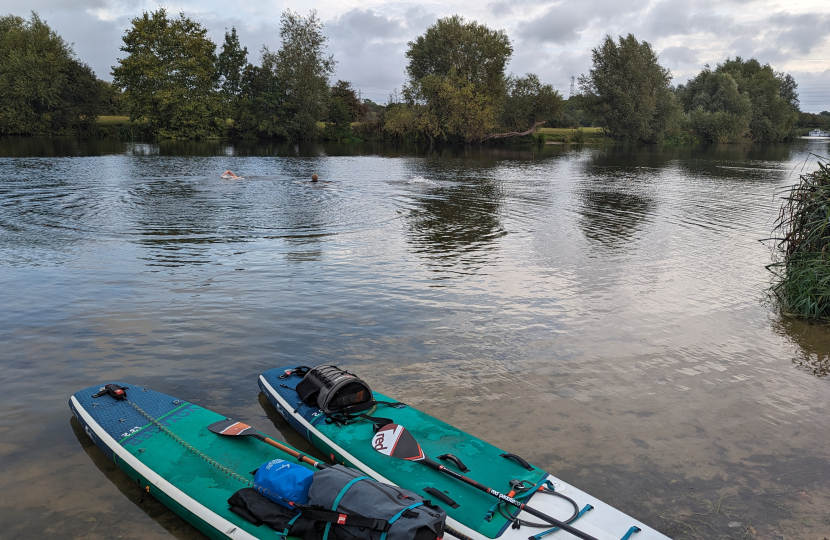
I continue to campaign to protect our rivers and waterways across Runnymede and Weybridge, and surrounding Green Belt and flood plain. From the ecological diversity, to the physical and mental wellbeing benefits to those who use and enjoy them, protecting our natural environment is important to us all.
The River Thames Scheme
The RTS is the single biggest measure, and investment, in mitigating the risk of flooding locally. You can see my specific work on this here.
Cleaning up our waterways
Water quality is clearly an issue that affect the whole country, but presents an acute challenge for residents locally. Some face the direct threat of overflows into their homes at times of heavy rainfall, with many more affected by the impact of overflows into our rivers and waterways.
Runnymede and Weybridge is criss-crossed with many rivers and streams which are used by residents and businesses and enjoyed by thousands each year. Ensuring water quality is therefore vital. I have supported the passage of the Environment Act and the Government’s Storm Overflows Discharge Reduction Plan of 2022, which introduced new requirements on water companies to reduce sewage overflows. In April 2023 I voted to make these legally binding on water companies, and called on all parties to work together to deliver practical and sustainable measures to protect and improve our waterways.
But we can still do more. That is why I will be working with the Environment Agency, Surrey County Council, Thames Water, Affinity Water, Ofwat and other local partners to improve local water quality, improve our water and sewerage infrastructure, and hold our water companies to account for their actions.
Water safety and flooding survey
With so many waterways throughout the constituency, water safety is important. Many residents use our lakes and rivers for swimming and water sports, which while great fun, also carry risks. Many residents also face the risk of flooding. To help inform my work to improve water safety and improve flood preparedness and responses, I have published a water safety survey, available here: Water Safety Survey | Dr Ben Spencer MP.
Responses to this survey will help to inform information campaigns and engagement with key stakeholders, to make sure residents have the information and access to services they need.
Protecting our natural environment
I am also campaigning to strengthen planning rules to ensure swifter action can be taken against rogue developers seeking to subvert the planning system for personal gain.
The planning process, while complex, shapes the communities we live in. It is therefore essential that national planning policy - the framework which governs planning and development - is robust and strikes the right balance between enabling development we need, and protecting the right of residents, the character of our towns and villages, and our natural environment. The Government have published a series of consultations on how these rules can be improved, and how new proposals can be implemented. You can see my response to each of these here:
https://tinyurl.com/Planningpolicy1
https://tinyurl.com/Planningpolicy2
https://tinyurl.com/Planningpolicy3
I have also directly campaigned for policy change. In 2021 I introduced my Planning (Enforcement) Private Members Bill which set out a range of ways to strengthen planning enforcement and protect our green belt. I am delighted that the Government have implemented one of my proposals as part of the Levelling Up and Regeneration Bill. This will now create a national planning database so local authorities can share information on planning issues more easily. The Levelling Up Bill is now making its passage through Parliament.
The Government have also consulted on options of how past irresponsible planning behaviour/breaches by developers could be declared by applicants and considered by authorities when applying for planning permission, as proposed in my Private Member's Bill. In my consultation response, I highlighted my support for a regime which would make previous poor behaviour a material consideration in local planning authorities' determination of planning applications.
Housing targets
In addition I also campaigned to protect our Green Belt from mandatory development, and was delighted that the Government has accepted changes to the targets for the planning system. These changes will allow councils to determine development priorities based on the needs of their local communities, and taking into account local landscape, including green belt and flood plains. This move away from policy based on an overly-deterministic algorithm will likely have a very positive impact on the challenges faced by councils like Runnymede and Elmbridge while still allowing the Government to tackle the challenges presented by the housing crisis and Britain’s historical low house-building numbers.
Infrastructure
With development must also come investment in infrastructure to ensure our communities retain good quality, accessible services, amenities and transport links. Due to the relative density of existing housing within Runnymede and Weybridge, the need for consideration of the cumulative impact of smaller developments is a particularly relevant for our constituency.
Numerous smaller developments can place pressure on local community services such as doctors, schools and other public services. In my most recent consultation response, I have requested that the Government give further consideration to how the cumulative impact of smaller developments can be monitored, assessed and mitigated as part of the new planning policy approach.
On important local infrastructure issues, such as sewerage and drainage systems, I have reiterated the essential need to ensure that planning policy mitigates any adverse impact on our communities as a result of river flooding, sewage flooding and surface water flooding.
I continue to campaign to ensure protection for existing communities is built in to our planning policy, through protection of our green belt and flood plain, but also through retention of community engagement in the planning process and input into design and development. My submissions also highlight the need to strengthen planning enforcement and ensure development is matched with infrastructure improvements. I have also raised issues regarding permitted development and change of use rules with Ministerial colleagues in response to concerns raised.
